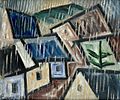fiction.wikisort.org - Writer
Josef Čapek (Czech pronunciation: [ˈjozɛf ˈtʃapɛk]; 23 March 1887 – April 1945[1]) was a Czech artist who was best known as a painter, but who was also noted as a writer and a poet. He invented the word "robot", which was introduced into literature by his brother, Karel Čapek.

Life
Čapek was born in Hronov, Bohemia (Austria-Hungary, later Czechoslovakia, now the Czech Republic) in 1887. First a painter of the Cubist school, he later developed his own playful, minimalist style. He collaborated with his brother Karel on a number of plays and short stories; on his own, he wrote the utopian play Land of Many Names and several novels, as well as critical essays in which he argued for the art of the unconscious, of children, and of 'savages'. He was named by his brother as the true inventor of the term robot.[2][3] As a cartoonist, he worked for Lidové Noviny, a newspaper based in Prague. Due to his critical attitude towards national socialism and Adolf Hitler, he was arrested after the German invasion of Czechoslovakia in 1939. He wrote Poems from a Concentration Camp in the Bergen-Belsen concentration camp, where he died in 1945. In June 1945 Rudolf Margolius, accompanied by Čapek's wife Jarmila Čapková, went to Bergen-Belsen to search for him.[4] His remains were never found. In 1948 the court officially set the date of his death as 30 April 1947.[5]
His illustrated stories Povídání o Pejskovi a Kočičce (English translation as The Adventures of Puss and Pup[6]) are considered classics of Czech children's literature.
Selected literary works
- Lelio, 1917
- Ze života hmyzu (Pictures from the Insects' Life), 1921 – with Karel Capek
- Povídání o pejskovi a kočičce (The Adventures of Puss and Pup), 1929
- Stín kapradiny, 1930, novel
- Kulhavý poutník, essays, 1936
- Land of Many Names
- Básně z koncentračního tabora (Poems from a Concentration Camp), published posthumously 1946
- Adam Stvořitel (Adam the Creator) – with Karel Čapek
- Dášeňka, čili život štěněte (Dashenka, consequently the life of a Puppy) – with Karel Čapek, illustrated by Josef
Gallery
- Letadlo (Aeroplane)
- Zpívající děvčata (Singing girls)
- Harmonikář (Harmonist)
- Krajina v dešti (Landscape in the rain)
- Kluci s kozou (Guys with a goat)
- Piják (Blotter)
- Matka s dětmi (Mother with children)
- Hra (Game)
- African King
- Autoportrét (Self-portrait)
See also
Literature
- Ivan Margolius, 'The Robot of Prague', Newsletter, The Friends of Czech Heritage no. 17, Autumn 2017, pp. 3 – 6. https://czechfriends.net/images/RobotsMargoliusJul2017.pdf
- Marie Šulcová. Čapci, Ladění pro dvě struny, Poločas nadějí, Brána věčnosti, Praha: Melantrich 1993-98
- Marie Šulcová. Prodloužený čas Josefa Čapka, Praha: Paseka 2000
References
- ed. Věra Menclová, Václav Vaněk (2005). Slovník českých spisovatelů (in Czech). Prague: Libri. pp. 111–113. ISBN 80-7277-179-5.
{{cite book}}:|author=has generic name (help) - Karel Capek – Who did actually invent the word "robot" and what does it mean? at capek.misto.cz (dead link) | archived at https://web.archive.org/web/20120204135259/http://capek.misto.cz/english/robot.html
- Robotics and automation handbook
- Jarmila Čapková, Vzpomínky, Torst, Praha 1998, s. 331.
- "Pejsek a kočička mají ještě autorská práva chráněna, Mein Kampf je volný". 8 January 2016.
- Čapek, Josef (1975). Harum Scarum: the adventures of Puss and Pup. London, UK: Carousel Books. ISBN 0-552-52054-3.
External links
 Works by or about Josef Čapek at Wikisource
Works by or about Josef Čapek at Wikisource Media related to Josef Čapek at Wikimedia Commons
Media related to Josef Čapek at Wikimedia Commons- Josef Čapek at the Internet Speculative Fiction Database
- Josef Čapek at Library of Congress Authorities, with 70 catalogue records
- Bratří Čapkové (The Brothers Čapek) at LC Authorities, with 6 records
На других языках
[de] Josef Čapek
Josef Čapek (* 23. März 1887 in Hronov, Österreich-Ungarn; † April 1945 im KZ Bergen-Belsen) war ein tschechischer Maler, Zeichner, Graphiker, Fotograf und Schriftsteller.- [en] Josef Čapek
[fr] Josef Čapek
Josef Čapek, né le 23 mars 1887 à Hronov et mort en avril 1945 à Bergen-Belsen, est un peintre, écrivain, photographe et illustrateur tchécoslovaque. Il est le frère aîné de l'écrivain Karel Čapek qui le désigne comme le réel inventeur du mot « robot »[1].[it] Josef Čapek
Josef Čapek (Hronov, 23 marzo 1887 – Bergen Belsen, aprile 1945) è stato un pittore e scrittore ceco.[ru] Чапек, Йозеф
Йозеф (Йосеф) Чапек (чеш. Josef Čapek, 23 марта 1887 года, Гронов, Краловеградецкий край, — между 13 и 15 апреля 1945 года, концлагерь Берген-Бельзен; объявлен умершим 30 апреля 1947) — чешский художник, график, фотограф , книжный иллюстратор, эссеист.Другой контент может иметь иную лицензию. Перед использованием материалов сайта WikiSort.org внимательно изучите правила лицензирования конкретных элементов наполнения сайта.
WikiSort.org - проект по пересортировке и дополнению контента Википедии









